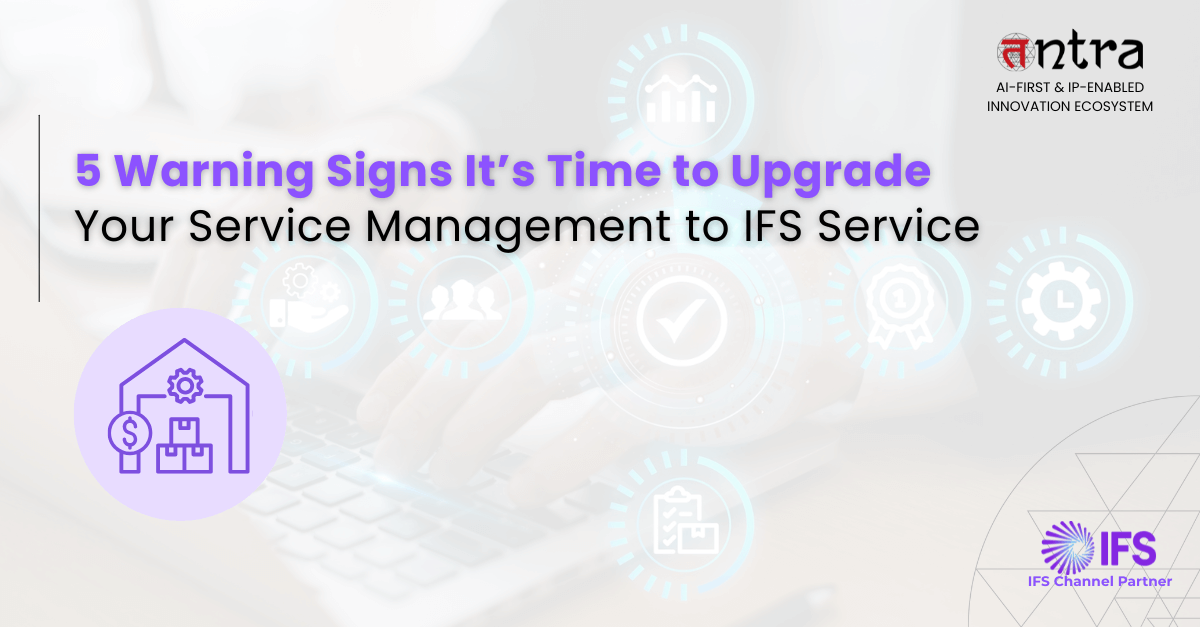
IFS FSM Software for Field Service Automation: Reducing Costs and Downtime
Table of Contents
ToggleIFS Field Service Management (IFS FSM) is transforming how organizations reduce downtime, optimize operations, and delight customers. By uniting field service automation, predictive maintenance, real-time scheduling, and mobile workforce management, IFS FSM gives decision-makers complete visibility and control. Whether you’re managing telecom networks, utility assets, or complex manufacturing equipment, IFS FSM ensures faster fixes, fewer failures, and greater efficiency. Backed by consulting expertise and ERP integration, it’s more than software, it’s a strategy for turning service into a growth engine. Continue reading to learn more…
If you’ve ever had to explain to a frustrated customer why their machine still isn’t working, you know the real cost of downtime. It isn’t just the lost hours of production or the service call expenses, it’s the hit to trust, brand reputation, and customer loyalty. For industries that depend on equipment uptime, manufacturing, telecom, utilities, or even medical devices, every minute of downtime feels like a minute of credibility slipping away.
That’s where IFS FSM (Field Service Management) comes into play. More than just a tool, it’s a complete field service automation engine designed to keep your teams moving, your customers happy, and your equipment performing at its best. Let’s break this down, not in abstract tech jargon, but in the way decision-makers like you actually think: results, reduced downtime, and growth.
Why Downtime is More Expensive Than You Think
Downtime is sneaky. On the surface, it looks like hours lost on a machine or a service call, but behind the scenes it creates ripple effects:
- Customers lose confidence because problems aren’t fixed fast enough.
- Employees get stuck juggling calls, schedules, and manual paperwork instead of fixing what matters.
- Leadership sees projects slipping, costs mounting, and revenue dropping.
And let’s be honest: many organizations still rely on fragmented systems or outdated spreadsheets to run complex field operations. That’s a recipe for slow response times and miscommunication.
Enter IFS Field Service Management. This is not just another tool in the tech stack. It’s designed to reduce downtime with IFS FSM at its core, connecting people, assets, and processes so you stop firefighting and start running service like a competitive advantage.
What Makes IFS FSM Different?
Plenty of software out there promises to help with field service. But very few combine the depth of ERP, asset management, and customer-facing service into one seamless environment the way IFS FSM does. Think of it as the Swiss Army knife for service-intensive businesses.
Here’s why leaders turn to IFS Field Service Partner ecosystems and Field Service ERP solutions to scale their operations:
- End-to-End Integration – From work order creation to scheduling, dispatch, and invoicing, everything sits in one place. No silos, no duplicate data.
- IFS Cloud FSM Advantage – A modern, cloud-native system that scales with your business and adapts as customer demands evolve.
- Customer-Centric by Design – IFS doesn’t just optimize internal processes; it ensures the end customer gets faster resolutions and smoother experiences.
If you’ve been asking yourself which is the best field service management software, the difference lies right here: integration plus intelligence.
Field Service Automation: The Core of Reducing Downtime
The term “field service automation” sometimes gets thrown around like a buzzword. But in practical terms, it means:
- Automating routine scheduling, so your dispatchers stop drowning in spreadsheets.
- Auto-allocating jobs to the right technician with the right skills and parts.
- Automatically updating customers with real-time ETAs.
- Capturing data from the field instantly, so no one is waiting days for reports.
This is where field service management software solutions shine. Automation in IFS service management isn’t about replacing humans, it’s about removing repetitive tasks so humans can focus on problem-solving and customer interaction. That’s how you reduce errors, speed up fixes, and ultimately slash downtime.
Real-World Example: A Manufacturer Under Pressure
Imagine a heavy-equipment manufacturer with thousands of machines across customer sites. When one of those machines fails, production at a customer’s facility halts. Traditionally, the service process might look like this:
- A customer calls to complain.
- Dispatch scrambles to find a technician.
- The technician shows up only to realize they don’t have the right part.
- Another visit is scheduled. Downtime extends. Customers get furious.
With an IFS FSM system, that cycle changes:
- The customer call (or IoT alert) auto-creates a work order.
- Dispatch sees which technician nearby has the right skills and inventory.
- A mobile notification routes the job instantly.
- Parts are already tracked in the FSM solution, so the tech arrives prepared.
- Fix happens in hours, not days.
That’s the power of field service software features, not just “tools,” but real outcomes that change customer relationships.
Why IFS FSM Leads the Pack in FSM Solutions
There are dozens of FSM systems in the market. But decision-makers often find themselves frustrated when those systems don’t connect well with ERP, asset management, or customer service platforms. That’s where IFS pulls ahead.
- One Platform, Many Capabilities – It isn’t just field service software features, it’s ERP-grade integration.
- Scalable Cloud Model – IFS Cloud FSM grows with you, whether you’re regional today or global tomorrow.
- Trusted Ecosystem – Working with an IFS Field Service Partner ensures expertise in tailoring the FSM solution to your exact workflows.
When analysts talk about the best field service management software, it’s not just about pretty dashboards, it’s about the ability to deliver measurable uptime improvements.
The Role of a Trusted IFS Field Service Partner
Technology by itself doesn’t guarantee transformation. A solution like IFS FSM becomes truly powerful when implemented with the right partner. A trusted IFS Field Service Partner ensures:
- Proper customization to your industry’s unique challenges.
- Alignment with your broader ERP and digital transformation goals.
- Training and adoption so your teams actually use the system instead of reverting to old habits.
This combination of advanced field service management software solutions and real-world consulting is what drives measurable downtime reduction.
Field Service ERP Solutions: The Bigger Picture
While IFS FSM is laser-focused on service, it doesn’t operate in a silo. As part of field service ERP solutions, it links to finance, supply chain, and manufacturing systems. That means when you dispatch a technician, you’re also tracking costs, inventory, and future demand forecasts.
This interconnectedness is what makes IFS service management stand out. Leaders no longer want separate systems for every function. They want one holistic view, and that’s what IFS Cloud FSM delivers.
Why Decision-Makers Should Care
Here’s the honest truth: customers don’t care how you organize your systems. They just care that when something breaks, you fix it fast. But for decision-makers like you, how you achieve that speed is critical.
Investing in a modern FSM solution like IFS FSM means:
- Faster first-time fixes.
- Reduced truck rolls (and fuel costs).
- Better workforce productivity.
- Clearer visibility for leadership.
- Happier customers who stay loyal.
It’s not just a technology upgrade. It’s a customer experience upgrade that translates directly into business growth.
IFS FSM Implementation Partner: Your Guide to Success
Deploying such capabilities doesn’t happen overnight. That’s where an IFS FSM implementation partner becomes indispensable. They translate strategy into execution, ensuring you don’t just buy the software but embed it into how your teams actually work.
Predictive Maintenance with IFS FSM
Here’s where things get really exciting: predictive maintenance with IFS FSM. Instead of waiting for failures, IoT sensors feed data into the FSM system, predicting when parts are likely to fail. Service gets scheduled proactively. Customers don’t even experience downtime, they just see reliable equipment and seamless service.
Real-Time Field Service Tracking
Real-time field service tracking is another game-changer. As a decision-maker, you get a dashboard that shows where your technicians are, which jobs are complete, and which ones are at risk of delays. No more blind spots. No more excuses.
Field Service Scheduling Automation
With field service scheduling automation, the chaos of juggling calendars disappears. The system automatically assigns the right technician at the right time, balancing skills, location, and availability. That means fewer errors, more efficient routing, and happier employees who aren’t overbooked or underutilized.
IFS FSM Consulting Services: Tailored Expertise
Every business is unique. IFS FSM consulting services bring tailored expertise to fine-tune your workflows, optimize reporting, and ensure leadership gets the insights they actually need. This is where organizations turn software into strategy.
IFS FSM Mobile Workforce Management
And finally, we can’t ignore the frontline heroes: your field technicians. IFS FSM mobile workforce management equips them with everything they need in their pocket, job details, customer history, inventory levels, and instant communication. No delays, no paper, no guessing. Just empowered employees delivering results.
Final Thoughts: Why Now is the Time
If you’re still on the fence about investing in IFS FSM, ask yourself: how much is downtime costing you today? Not just in lost hours, but in lost trust, revenue, and customer loyalty.
With field service automation powered by IFS Field Service Management, you’re not just fixing problems faster, you’re preventing them, delighting customers, and scaling operations with confidence. Whether it’s through predictive maintenance with IFS FSM, real-time field service tracking, or IFS FSM consulting services, the opportunity to transform is right here.Downtime is costly. But with the best field service management software, IFS FSM, you have the power to turn service into your biggest competitive advantage.
FAQs
What is IFS field service?
IFS Field Service is a comprehensive solution that helps businesses manage, schedule, and optimize field operations, covering everything from work orders to real-time service tracking.
How much does IFS Field Service Management cost?
IFS FSM pricing varies based on company size, number of users, and deployment requirements. Costs are typically customized, with both cloud and on-premise models available.
What is IFS service management?
IFS Service Management is a suite of tools designed to streamline customer service, field operations, and asset management, ensuring faster response times and reduced downtime.
How does IFS Field Service Management (FSM) reduce downtime in asset-heavy industries?
By automating scheduling, ensuring parts availability, and providing technicians real-time data, IFS FSM minimizes delays and improves first-time fix rates in asset-intensive environments.
How can predictive maintenance in IFS FSM minimize unexpected failures?
Predictive maintenance uses IoT and analytics within IFS FSM to detect issues early, schedule service proactively, and prevent unexpected equipment breakdowns.
Why is real-time scheduling and tracking important for reducing service delays?
Real-time scheduling and tracking ensure the right technician, tools, and parts are available at the right time, cutting delays and boosting service efficiency.
 Download IFS Guide
Download IFS Guide 




